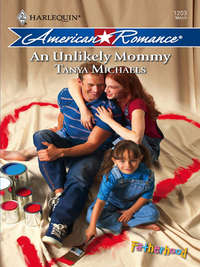
Полная версия
A Dad for Her Twins
She’d been his link to just about everything outside the studio, reminding him that there was a movie coming out he might like, reminding him of the names of acquaintances at openings, reminding him that he hadn’t bothered to eat in nearly twelve hours. “How can I trust that you’re going to help take care of this baby,” she’d teased him once, “when you can’t even remember to take care of yourself?”
Pregnancy had transformed her from the shyly smiling girl he’d first met to a laughing, excited woman with irrepressible humor. I plan to decorate the nursery behind your back—I know you’re the big-shot artist, but I’m scared you’ll turn it into some abstract expression on spatial dynamics. I was thinking ducks and bunnies.
“JT!” Sean’s tone was pitched halfway between annoyance and concern. “Did you hear anything I said? You had that look again.”
Stalling, JT sipped his water and tried to bring himself back to the present, a difficult feat given how much part of him longed to remain two years in the past. For the first few months after her death, thinking of Holly had hurt, creating electric shocks of pain that racked his whole being. Now that the sting had lessened, recalling cherished memories was comforting, beguiling. Easier than facing a future without her.
“It’s hard,” he said simply.
“I know.” Sean lowered his gaze, a touch of sadness creeping into his own voice. “I know, man, but Holly wouldn’t want you to be miserable. She would have wanted you to move on with your life. And she’d definitely want you to paint.”
It wasn’t as if he hadn’t tried. The encaustic series he’d collaged in the weeks after the funeral—a sickening double funeral during which he’d felt he was putting his entire world into the ground—was his best work ever. But the frenzied creation of those paintings had hollowed him out somehow, leaving a void where inspiration had once been. He’d allowed Sean to hang the dark wax-and-oil images at the gallery, but couldn’t bring himself to sell them.
The gallery. JT willed himself to focus. It wasn’t fair that he left everything up to Sean these days; the two men were supposed to be equal business partners. JT was the one who knew art; Sean was gifted with people and finances.
Out of nowhere JT thought of the book he’d seen Kenzie holding—something about number crunching. Then there had been the reproachful set of her rosy mouth when she’d mentioned the importance of money. I should introduce her to Sean. Though the thought was mostly facetious, it certainly wouldn’t be difficult to arrange. JT lived directly across the hall from his new neighbor.
“I’ve lost you again,” Sean muttered.
“I was thinking about setting you up on a date.”
“Seriously?” Sean grinned. “Not that I’ve ever needed help meeting ladies, but I take it as a good sign that you’re thinking about anyone’s love life.”
“I’m not a monk,” JT said defensively.
JT had gone on a half-dozen dates this year, but nothing lasting had come of them. It wasn’t just that he missed Holly, it was more that he was still unsure of who he was without her. They’d met in Chicago when they were both college students. He’d become an adult during the years they’d been dating; he’d become a critically acclaimed artist during their marriage. He’d been about to become a father. With all of that taken away…
Since her death, JT had slept with only one woman, an art dealer Holly had liked and respected. In a bizarre way, JT had felt his late wife would approve. Marsha had been recovering from the shock of her husband walking out on her, needing to reaffirm her own feminine attraction, and JT had craved the touch of another person to penetrate his isolation. Their affair had lasted less than a month before they parted amicably, each somewhat healthier for the encounter, but knowing they had no future together. Sean had hinted several times that JT needed more of a social life. Even Mrs. Sanchez, who lived on the second floor of Peachy Acres and had appointed herself JT’s godmother, for lack of a better description, nagged that his apartment needed a woman’s touch.
Thankfully, the waitress came to take their orders, which gave JT something to think about besides his inability to paint and unwillingness to date.
Would there come a day when he could once again consider painting a joy, not an obligation? Would he ever again view love as a blessing and not a dreaded danger?
Some of his best paintings had evolved from brushstrokes with no direction, just moving his arm intuitively and watching to see what evolved on the canvas. If he kept getting out of bed each morning and facing each day, one after another, would his life begin to take some kind of shape? He couldn’t be certain. But in the absence of an actual plan, he supposed he’d find out.
KENZIE THROBBED everywhere—muscles she hadn’t realized she possessed were angrily making their presence known. She had a ton of unpacking to do, but all she really wanted was a long, hot soak in the bathtub. There wasn’t time, though. Ann had called from her cell phone to say she was en route with the kids and “backup brawn.” Besides, Kenzie was scared to test the bathroom’s hot water. If it, like the building’s elevator, the ceiling fan in her bedroom and the stove’s faulty pilot light, neglected to work, she might cry.
Reminding herself that those were all minor inconveniences easily fixed, Kenzie grabbed a bottle of water from the refrigerator. Heck, she’d already relit the pilot light herself, and the worrisome smell of gas had dissipated. She sat on the brown living-room carpet, a shade probably chosen because it wouldn’t show stains. That could come in handy with two kids. When the knock sounded at her door, she wasn’t sure her legs would cooperate enough for her to stand, but she managed. Just barely.
Instead of the relatives she’d expected, it was Mr. Carlyle, a short man of indeterminate age. His thick hair was the color of freshly fallen snow, unmitigated by gray, and he had exchanged the navy track suit he’d worn this morning for an Atlanta Braves T-shirt with jeans and a tool belt.
“Afternoon, Miss Green.” He peered past her at the cardboard boxes stacked beyond. Her apartment looked like an elementary student’s homage to Stonehenge. “You settling in okay?”
“More or less.”
“I won’t bother you long, just came up to tell you the elevator’s working again.”
Oh, happy day! She and Forrest would need to bring the mattresses up through the stairwell, but the elevator would make everything else easier. “That’s wonderful news. Thanks, Mr. Carlyle.”
“Just doin’ my job—and call me Mr. C. Everyone in the building does.”
It’s what JT had called the man this morning. For a moment, it was on the tip of her tongue to ask the property manager about the handsome mystery man. She assumed JT lived here, but didn’t know that for sure. What was his last name? Did he ever smile? She ignored the random thoughts, telling herself they stemmed from exhaustion. Normally she was too worried about taking care of her own household to be nosy about others.
Kenzie had just finished giving Mr. C. a rundown of small repairs needed in the apartment when the elevator at the end of the hall dinged. The doors parted, and a teeming mass of cranky humanity spilled forth. Blond Leslie and dark-haired Drew led the way, bickering and power walking, each apparently determined to reach their mother first. Behind them, Ann’s infant daughter, Abigail, was screaming bloody murder in her car seat. As Ann approached, Kenzie saw two wet circles on the front of her sister’s shirt and tried not to feel relieved that Ann looked harried for a change. With them was her husband, Forrest. At first glance, he seemed to be talking to himself, but Kenzie quickly realized that he was wearing an earpiece attached to his phone and was trying to set up a tee time.
Amidst the noise—perhaps because of it?—the door directly behind Mr. C. opened, giving Kenzie a clear view of the person framed in the doorway. JT.
JT lived in the apartment across from her?
Her eyes locked with his, but calls of “Mom! Mom!” broke the spell. She looked toward her two kids and, in her peripheral vision, saw JT quickly shut his door. No doubt he was hiding on the other side, thinking, There goes the neighborhood.
FROM THE TWO HOPELESS expressions aimed at Kenzie as she set paper plates on the coffee table, one would think the kids were being served their last meal.
She sat cross-legged on the floor on the opposite side—tomorrow, she’d get around to assembling the white pine dinette set. “Guys, you know this is only temporary. Everything will get better soon.”
“Easy for you to say,” her son said morosely. “You’ll meet new people at your job. How are we supposed to make friends this summer?”
Kenzie knew from asking Mr. Carlyle that, of the twelve units in the building, ten were currently occupied, including hers and Mr. C.’s, which was on the first floor. He’d said there were a few teenagers in the building and one toddler, but no other elementary-school-aged kids.
Drew heaved a dramatic sigh, sounding for a change just like his sister. “We’ll practically be shut-ins until school starts!”
The twins had protested that they were too old for day care. Kenzie had grudgingly said they could stay here by themselves for the duration of summer break—with her coming home each day for lunch and Ann making habitual drop-ins to keep them on their toes. Yet even after they’d begged permission to stay alone, Drew managed to make it seem as if a form of torture was being inflicted on them.
“School starts in a few weeks,” Kenzie told them. “It will be here before you know it!”
Leslie picked at the crust on her tuna fish sandwich. “I miss my friends.”
After less than twenty-four hours? “North Carolina isn’t far. We can visit sometimes. Once we move into the house, we’ll invite Stacy to come stay for a weekend.”
“What about Paul?” Drew demanded from around a bite of sandwich. He never let being depressed stand in the way of his appetite. In fact, if Leslie continued to ignore her own food, he’d probably ask if he could have it.
“Sure,” Kenzie said. “We could invite Paul, too. If the two of you behave, and after we’re all settled.”
“You mean once we have furniture again?” Drew asked.
With a spring starting to poke through the ugly upholstery, their thrift-store couch hadn’t been worth the trouble to move. At this precise moment, just about everything seemed like more trouble than it was worth. But, as she’d promised the kids, it would get better. She had a few more days before she was due at work; maybe they should check the budget and spend half a day on something fun.
“There’s lots of cool stuff to do around Atlanta,” she stated. “Stone Mountain, the aquarium downtown, the Coke Museum, a planetarium.” When she received only halfhearted murmurs of agreement, she played her ace. “Six Flags?”
Leslie glanced up with shining blue eyes. “Really? You never let me go anywhere with roller coasters!”
“Well, it’s not like we had any theme parks in Raindrop.”
“You promise you’ll take us?” Leslie asked skeptically.
“Yes, but I’ll need to get my first paycheck before we go.”
“At least that’s something to look forward to,” Drew allowed before his face fell again. “We may not have had roller coasters back home, but I could have spent the summer swimming at Paul’s. What kind of apartment doesn’t have a pool? I thought that was, like, standard.”
Instead of a pool, there was a communal balcony area on the roof, complete with grill and a couple of lounge chairs, which spared her the arguments about the kids swimming unsupervised while she was at work, thank goodness. “This place isn’t so bad. And it’s the only three bedroom we could afford.”
“Small bedrooms,” Leslie muttered, joining her brother for a seat on the Whiny Train.
“You guys would rather I find a place where you can share a room?”
The twins exchanged looks of mutual horror, quickly chorused, “No, Mom,” and went back to their sandwiches without further complaint.
Drew didn’t speak again until he was finished. “Mom, can I ask you something?”
“Of course, sweetheart.”
Leslie darted a glance at her brother, shaking her head emphatically. Uh-oh. Whatever was coming next, the twins had clearly discussed it already…and disagreed. Big surprise.
“What is it, you guys?”
Drew steadfastly refused to look at his sister, who was attempting to bore holes in his skull with her glare. “Did you let Dad know we were moving? Does he have a way of, I dunno, reaching us here?”
“Oh, honey.” Kenzie’s heart constricted into a tight fist. “I left a message at his last known phone number, but the person who lived there said she hadn’t seen your father in weeks.”
“Told you.” Using her thumb, Leslie crushed a corn chip on her plate. “If he cared about seeing us, or even hearing from us, he’d make it easier to find him.”
“You take that back!” Drew’s features contorted in fury, but beneath the youthful rage, he looked achingly vulnerable. Kenzie wanted to pull him into her lap for the hug she knew he wouldn’t accept. “Dad does care.”
Leslie rolled her eyes. “You really are a dummy.”
“Leslie Nicole! You can apologize to your brother or go to your room.”
The girl stood, her posture defiant.
“Les…” Far from sounding angry now, Drew’s tone was imploring. He wanted her to share his belief that their father loved and missed them and would make more time when he finally “hit it big.” Drew was the one who still allowed himself to hope, and Kenzie thought that was why he was always the angriest when Mick let them down.
Leslie tried to feign indifference. When the subject came up, she informed people that she didn’t miss her father and that they were better off without him. But Kenzie had heard Leslie sniffling behind closed doors after these declarations. Kenzie watched her daughter go now, wondering what was the best way to handle the situation. Which was more detrimental—verbally bashing her ex and disillusioning her kids, or allowing them fruitless hope?
“Dad will visit us again,” Drew maintained. “Eventually.”
They never knew when Mick would pop back into their lives. His sporadic phone calls usually came—at an inappropriate hour—from wherever his band was playing. Most years he managed to send small, truck-stop Christmas presents that his son treasured as if they were gold. Three times since the divorce was final he’d actually sent Kenzie cash. Mick Green wasn’t an evil man, but he was unreliable, inconsistent and suffered tunnel vision, keeping his eye on an unlikely prize and clinging to a fantasy of what he wanted to be when he grew up. Just as he hadn’t listened when she’d said the Jagger-nots might not be such a great name for his band, he’d resisted her suggestions over the years that maybe it was time to find a different way to earn a living. Preferably something that generated income.
Would it be best if he stopped contacting the kids altogether? Given the way Drew was looking at her now, his heart visible in his sapphire eyes, she couldn’t bring herself to ask Mick to do that.
“He could visit,” she finally conceded. “I think it’s unlikely we’ll see him soon, but you never know.”
Kenzie had never found time for another man in her life—not that there’d been a huge selection of age-appropriate bachelors in Raindrop. If she ever dated again, it would be a steady, predictable man with no creative aspirations. Someone she could depend on.
In the meantime, she’d just keep depending on herself.
Chapter Three
Though JT routinely lost track of time, his stomach always growled right on schedule at six on Friday. Enchilada night, or possibly taco casserole. His doorbell buzzed at exactly the expected hour—you could set a clock by Mrs. Sanchez—and he crumpled the drawing he’d been working on, tossing it in the general vicinity of an overflowing wastebasket. I should empty that. Mrs. Sanchez would bust his chops about the mess.
He opened the door of the apartment. Roberta Sanchez, who’d raised four children and was approaching double that in grandkids, lived below him with her husband, a MARTA bus driver. When she’d first heard that a widower had moved into Peachy Acres, she’d shown up with a covered pot of chicken tortilla soup. Food had followed every Friday since, with flan on his birthday.
“Buenas noches, Jonathan.” She marched toward his kitchen with a foil-wrapped glass pan.
“Nobody calls me that,” he reminded her.
Over her shoulder, she hitched a dark eyebrow. “Are you calling me a nobody?”
“Of course not.”
“Then shut up. Now be a good boy and find me a clean spoon, if such a thing exists here. No wonder you are uninspired to create beauty, living in such disorganization! Have you painted at all this week?”
He rummaged through a drawer. “You sound like Sean.”
“I sound nothing like that degenerate!” She sniffed. “You should have heard him flirting with my daughter Rosa in the elevator. It’s inappropriate, the things he says to a married woman.”
JT grinned inwardly, knowing full well that Mrs. Sanchez adored Sean, a feeling that was mutual even though Sean called her the Battle Ax.
She paused. “You’re not expecting him, are you? Maybe I should have brought more.”
He eyed the pan. “That would feed an entire dinner party. Is Enrique working the night shift? You could join me.”
“If you want me to join you, you should clean up this pit first.” Despite her words, she pulled two plates down from the cabinet. “I’ll stay. The good Lord knows my company is as close as you’ll get to a dinner party. You don’t want to be a hermit, Jonathan.”
“I’m doing my part to uphold the reclusive artist stereotype.”
“To qualify as an artist, shouldn’t you produce art of some kind?”
Touché. “Nag, nag, nag. It’s a wonder your children haven’t moved farther away.”
She sniffed again, not dignifying his jibe with a response.
The Sanchez family was the kind of close-knit group neither JT nor Holly had ever possessed. Holly would have loved Mrs. Sanchez; initially, that had been why he’d put up with the older woman’s intrusions. But she’d won him over with her drill-sergeant tone and twinkling dark eyes. She seemed to understand his loss without ever expressing the cloying pity that made him want to withdraw more. Plus her cooking was a little piece of pepper-laced heaven.
JT didn’t have a kitchen table, merely three padded, high-backed stools pushed up to the counter. He cleared away a pile of junk mail and an empty pizza box to make room for them to eat. Mrs. Sanchez pulled a carton of milk out of the refrigerator, opened it and immediately grimaced.
“Jonathan, this milk is older than some of my grandchildren.”
“An unfair comparison. You have grandkids born every ten minutes!” He said it lightly, but it was the Sanchez babies that had made him leave the rooftop Fourth of July picnic last month.
Roberta had browbeaten him into attending, but he hadn’t been able to bear it for long. Just as he hadn’t been able to bear the empty nursery in the house he’d shared with Holly. After all the work she’d put into it, wanting it to be perfect for their child, he couldn’t bring himself to paint over a single duck or bunny. The crib he’d assembled sat obscenely empty, and a month after he’d lost his cherished wife and the daughter he’d never had a chance to know, he’d bent over the railing and finally cried, ugly hoarse sobs that felt as if they were splitting him in half. From the moment the doctors had given him the news at the hospital, throughout the memorial service, he’d been too shocked and disbelieving to truly cry. Once he had, instead of feeling better for having poured out some of the pain, he’d been pissed off at the senseless loss.
He’d locked himself in his studio, barely eating or sleeping, trying to purge his enraged grief with painting. When he’d finished the series, he’d been like a man coming out of a coma, disoriented and unsure of how much time had passed. He’d wandered through his own house like a ghost, stopping in the nursery—that bright, cheerful room where he’d wept until he wished he’d died with them. Then he’d walked straight to the phone and arranged to put the house on the market, not caring where he lived as long as it was elsewhere.
“Jonathan.” Suddenly Mrs. Sanchez was there, touching his shoulder. “Sit down. Eat. You need sustenance.” She blessed the food, with a little pause before saying amen and making the sign of the cross. Had she added an extra silent prayer on his behalf?
It was odd. The only child of a wealthy couple, JT hadn’t felt guilty that he was “disappointing” his parents by not going to law school and following in his father’s footsteps. The elder Trelauney stubbornly spoke of a father-son practice even though JT had no interest in becoming an attorney. Instead of wasting his time arguing, JT had simply continued painting, ignoring his father’s scorn over the “pointless scribblings.” You’re on the cusp of manhood, son. Act like it! You’re not some finger-painting toddler. Yet JT had refused to feel ashamed. Now, by not painting, he felt he was disappointing Sean and Mrs. Sanchez—people who were better to him than he deserved—and that bothered him far more than his family’s disapproval ever had.
Though he wasn’t particularly hungry, he forced himself to take a bite of the enchiladas and was immediately rewarded with a spicy blend of rich flavors. “This is really good.”
“I believe you meant great.”
“I believe I did.”
She reached for her glass of water. “You are a good boy, Jonathan. Even if you are a slob.”
He surprised them both with a genuine chuckle.
Mrs. Sanchez looked pleased by this progress. “Mr. C. tells me that someone has moved in across from you. I’m glad. It’s too quiet up here, with 3A unoccupied and that flight attendant in 3B gone half the time.”
JT thought of that moment yesterday when he’d heard a baby shrieking, and had flung open his door. He still didn’t know exactly why he’d reacted that way or what he’d expected to find. Though there had been only a handful of people on a floor that was often deserted except for him, it had sounded as if a deafening mob had descended. He’d heard plaintive shouts of “Mom” clearly directed at Kenzie. Was the baby hers, too? He didn’t think so, but he hadn’t stuck around long enough to inquire.
He winced at the memory and turned to his dinner guest. “It looks like my quiet days are over. The new neighbor lady has kids. Two, maybe three.”
“Two,” Mrs. Sanchez confirmed. “I asked Mr. C. He also mentioned she has no husband.”
Was Kenzie divorced? Widowed, like himself? Technically, the presence of kids didn’t require a husband in the first place. Maybe she’d never been married. There could still be a serious boyfriend in the mix. JT experienced a funny twinge in his chest he didn’t want to examine too closely.
Feeling that he was being watched, he jerked his head up and found Mrs. Sanchez studying him. He didn’t like the speculative gleam in her eyes.
“No,” he said automatically.
She blinked. “I don’t know what you mean.”
Deciding this was as good a time as any to take her advice about tidying up, he rose and went to the dishwasher.
“You told me she had kids,” Mrs. Sanchez said. “So you’ve met them?”
“Just her. Briefly.” Despite his attempt to sound dismissive, the memory was vivid.
Kenzie Green had looked like the wreck he felt like on most days, yet there’d been determination glinting in her eyes and an unmistakable lifting of her chin when she’d stood to regather her belongings. He’d had the impression that life had knocked her down before and she was resolved to get back on her feet as many times as necessary.
“Well,” Mrs. Sanchez prompted. “What is she like?”
“I don’t know. About your height, blondish. I didn’t exchange life stories with her.”
“No,” Mrs. Sanchez said, her voice disconcertingly gentle. “You wouldn’t have, would you?”








